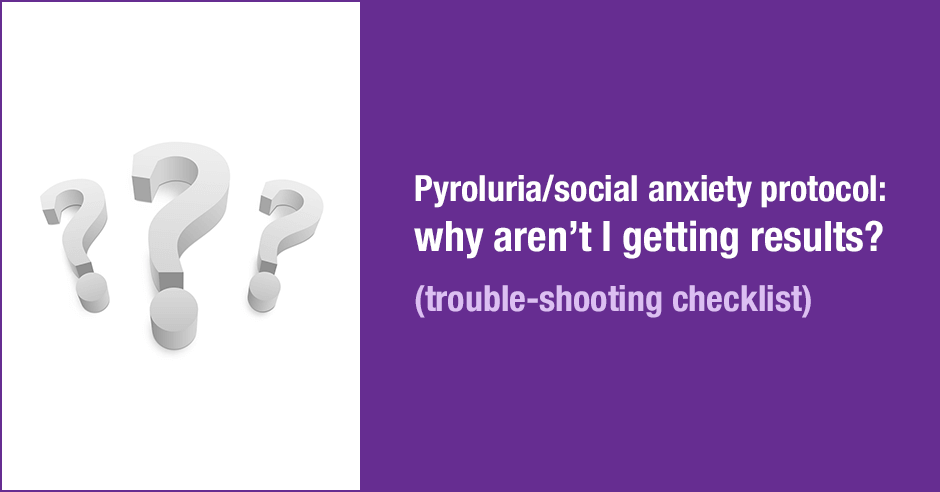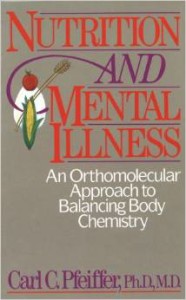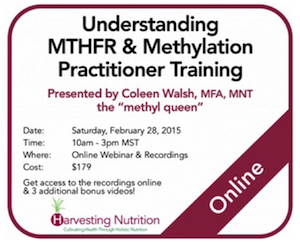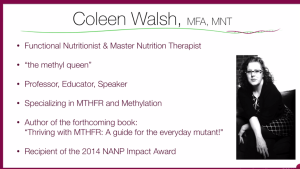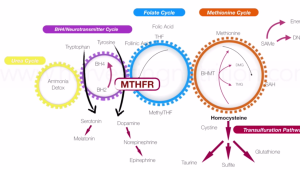The Healthy ME Summit: Overcoming Depression and Anxiety runs Jan 7-17, 2016. Here are some snippets from the excellent interview with Carolyn Ledowsky, Naturopath, Herbalist, Nutritionist: MTHFR, Depression & Anxiety.
MTHFR is a gene that helps the conversion of folate to the active form. When you eat leafy greens the body goes through many metabolic processes to change the folate to an active folate and this active folate is what we call a methyl group.
It’s this methyl group that acts as a master switch in really important processes in our body… it helps detoxify chemicals and heavy metals, and really importantly it helps us make glutathione (our major antioxidant that protects us from free radical damage), it helps to process hormones and it’s really important in the stress response.
Stress uses up a lot of our methyl groups and some people use up all their methyl groups when they are really stressed. They can turn the stress response on but then they don’t have enough to turn it off so they stay in this hyper-stress state.
If you have a lack of methyfolate or methyl groups then you don’t have enough components to generate neurotransmitters like serotonin and dopamine.
I would say 80% of people with MTHFR who come to our clinic would experience anxiety or depression and for some of them it’s had a huge impact on their lives and they just can’t function.
Carolyn shares some of the early research on folate and depression, psychosis and schizophrenia; how SAMe is the distributor of all these really important methyl groups to every part of the body; the importance of vitamin B12, zinc, vitamin B6 and how elevated homocysteine is neurotoxic and has a massive impact on mood; how the mutations in the COMT gene can make you less able to tolerate methylfolate; why a vegan or vegetarian diet can be a big factor with anxiety and depression.
She also covers pyroluria (and low zinc and low vitamin B6) as well as high copper and infections:
You can actually get a copper toxicity depression (even without pyroluria). You can have high copper with estrogen dominance, low iron, low molybdenum and one of the key strategies is to balance copper and zinc (and look at why zinc is low to start with)
Strep infections can increase excitatory receptor activity, decreasing GABA levels and impairing speech in kids with autism
It’s a really excellent interview and not to be missed!
Here are more details about the Healthy ME Summit: Overcoming Depression and Anxiety, January 7-17, 2016.
You will discover 50 of the brightest and most brilliant minds in the field of mental health and wellness. The interviews are a collection of experts, as well as individuals sharing their inspirational personal experiences. The culmination of both of these points of view provides you the listener with the answers and solutions to your mental health challenges.
Here are a few of the other excellent speakers and topics:
- Nicole Bijlsma, Author, Naturopath, Acupuncturist: Mould The New Asbestos [this is the Australian spelling of mold]
- Therese Kerr, Author, Speaker, Health Ambassador: Chemicals in Cosmetics to Avoid
- Amy Myers, MD, Author: The Autoimmune Solution for Mental Health
- Reed Davis, Functional Nutritionist: Addressing Metabolic Chaos
I’m thrilled to be included in this line-up of experts and I’ll be sharing Nutritional Solutions for Anxiety – and will cover the amino acids GABA and tryptophan, and the social anxiety condition pyroluria.
Hope you can join us! You can learn more and register here:
http://overcomingdepressionandanxiety.com/infuisonsoft.php?p=TrudyScott&w=hme


